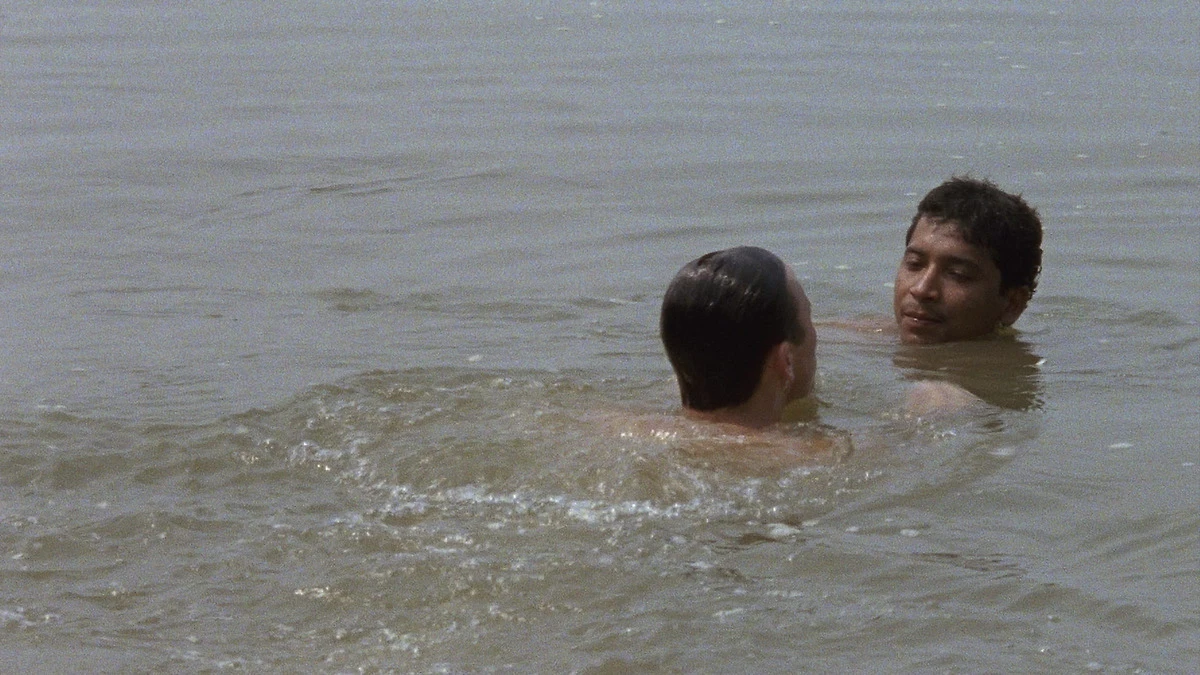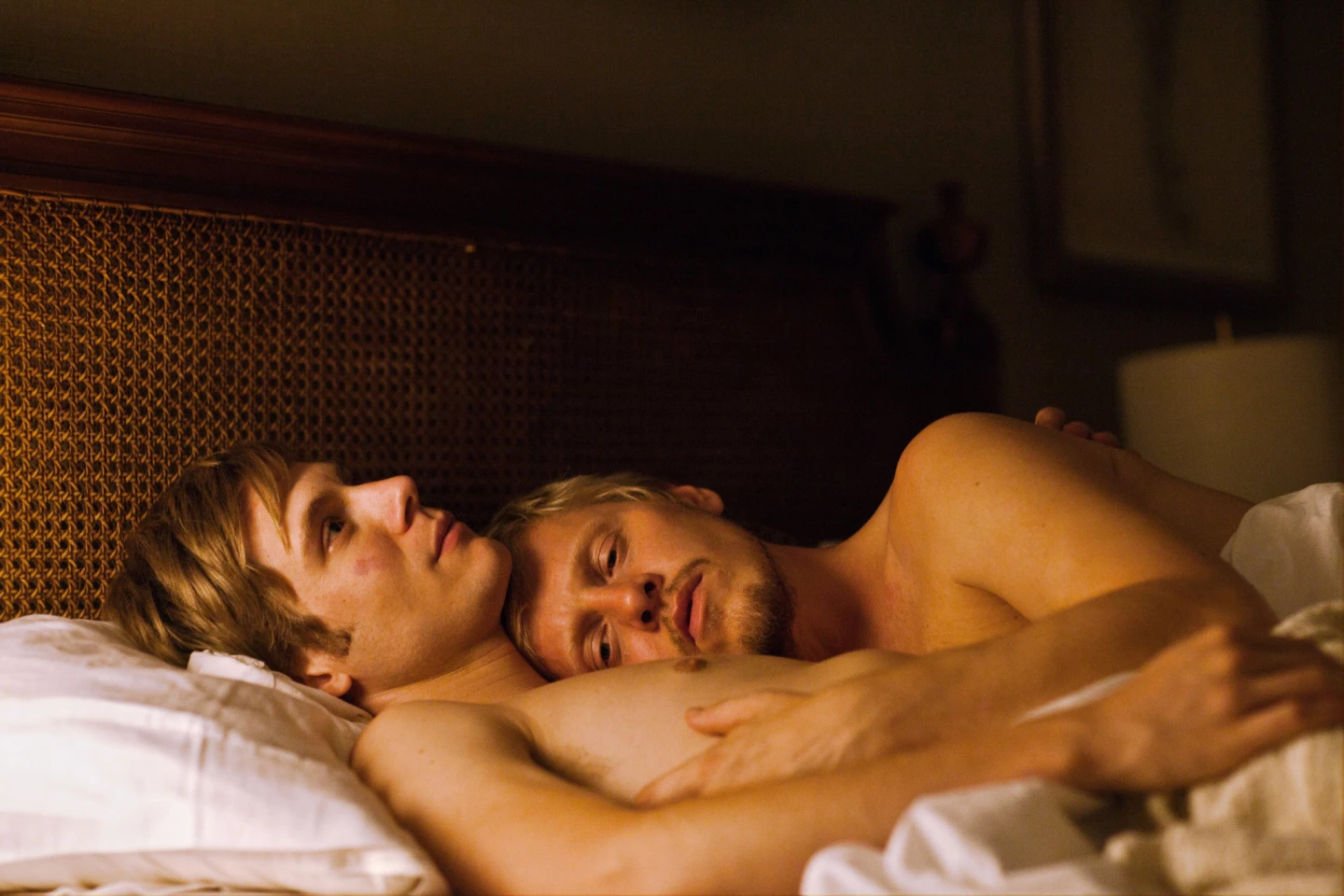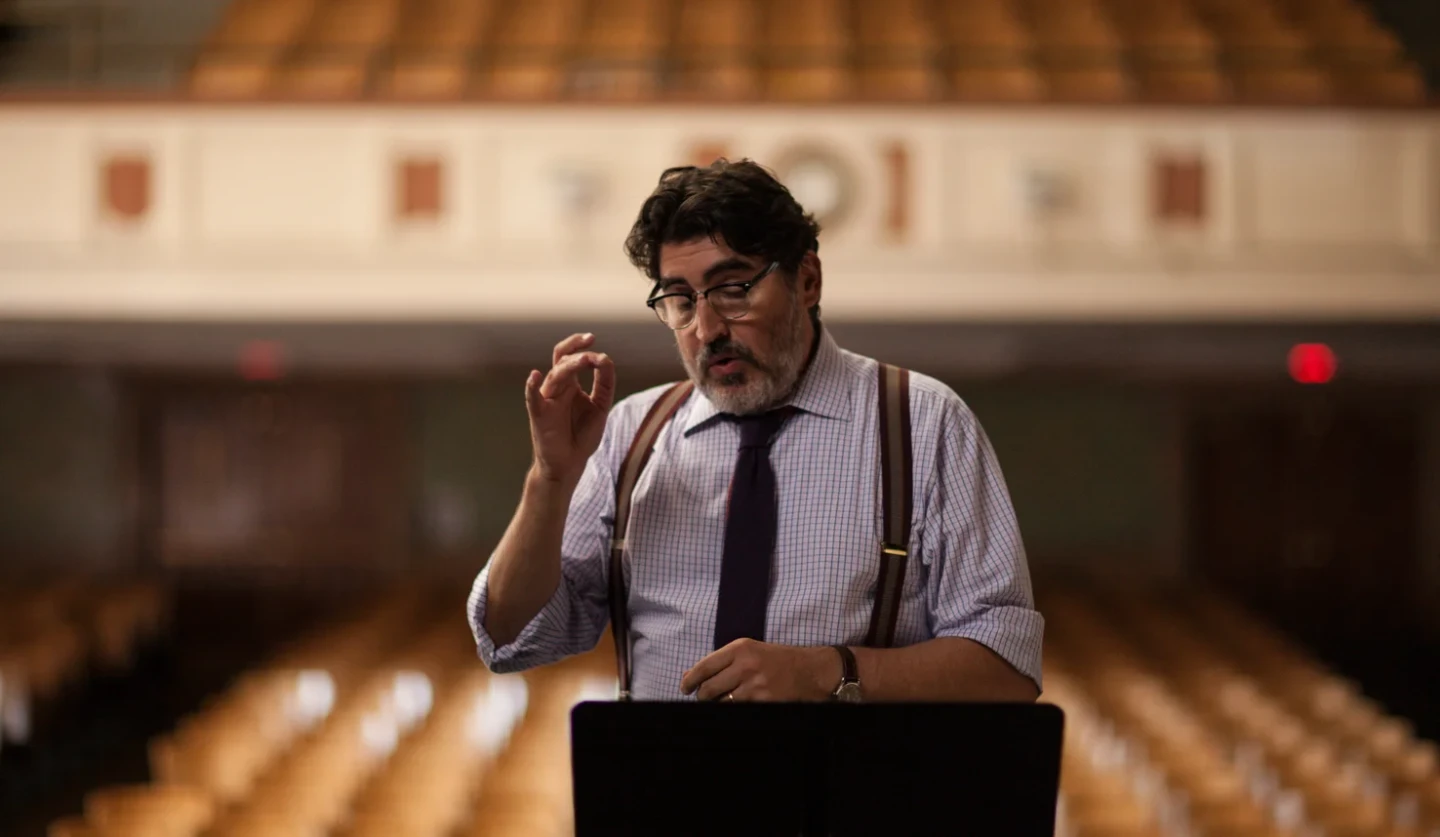
Ira Sachs, Keep the Lights On, 2012, film
Held on 20, 21, 22, 23 Nov 2025
The International Festival of LGBTQIA+ Cinema in Madrid (QueerCineMad) and the Museo Reina Sofía come together to organise a retrospective on Ira Sachs (USA, 1965), a pivotal film-maker in contemporary queer cinema whose work has charted, across three decades, the affects, losses and resistance that traverse the lives of the LGBTQIA+ community. Sachs is the creator of a filmography which conceives of New York as the emotional architecture of his narratives, and as a space of memory, struggle and community. This programme includes the premiere of his most recent film, Peter Hujar’s Day (2025), in Madrid, with the film-maker in attendance in three of its sessions.
Sachs has filmed, with delicacy and conviction, the tensions between desire, precarity and belonging, from his first feature-length film, The Delta (1996), set on the margins of the Mississippi, to Love Is Strange (2014), where a gay couple have to give up their Manhattan apartment after marrying. In Keep the Lights On (2012) intimacy becomes a battleground in confronting addiction and neglect, while Lady (1994), a short film on the solitude of an elderly woman in New York, anticipates his sensibility for bodies made invisible. Last Address (2010) is a silent homage to queer artists who died from AIDS/HIV-related illnesses — Robert Mapplethorpe, Keith Haring, David Wojnarowicz — whereby the façades of the buildings they lived in become intimate monuments, the remnants of history erased through windows. Thus, Ira Sachs’s body of work engages in a profound dialogue with film-makers such as Rainer Werner Fassbinder in situating the gaze at the centre of bodies, in exploring the complexity of the struggle between himself and his films. Further, his practice reverberates through New Queer Cinema, a 1990s film movement that transformed the representation of sexuality from difference.
The director’s presence in Madrid, coupled with the premiere of his new work, makes this film season an event which extols both his career and his form of gazing and inhabiting the city from the queer, the community and the poetic. In these times of eviction and urban homogenisation, Sachs’s film-making reminds us that the neighbourhood can also be a gesture of care, a form of resistance, a future promise.
Organised by
QueerCineMad (The International Festival of LGBTQIA+ Cinema in Madrid) and Museo Reina Sofía
Accessible activity
This activity has two spaces reserved for people with reduced mobility
Agenda
jueves 20 nov 2025 a las 19:00
Session 1. Ira Sachs. The Delta and Lady
The Delta. USA, 1996, colour, original version in English with Spanish subtitles, 85’
Lady. USA, 1994, black and white, colour, original version in English with Spanish subtitles, 28’
“Coming out means to put your authenticity first, before another attempt at pleasing others”, states the leading character of The Delta, Ira Sachs’s debut feature on the double life of a white, middle-class teenager in the 1990s. The film explores the character’s inability to be himself on account of the guilt that stymies his desire — cruising is his way out of being repressed, the only route to finding his own small fiction, the place where he feels he belongs. Sachs employs the stage of desire in the early Gus Van Sant of Mala Noche (1986) and his contemporary Wong Kar-wai with Happy Together (1997). In Lady (1994), meanwhile, an anonymous woman in a red wig welcomes a team of documentary makers into her New York apartment; the team record her daily life as she argues with her boyfriend and gossips with her friend. The scenes alternate with black-and-white images of a woman with a red wig who escapes from suburban life.
viernes 21 nov 2025 a las 19:00
Sesión 2. Ira Sachs. Keep the Lights On
USA, 2012, colour, original version in English with Spanish, 101’
—With a presentation by and conversation with Ira Sachs. In this session, the festival, led by filmmaker Diego Céspedes, presents the honorary award to the director.
Keep the Lights On (2012), winner of the Teddy Award at Berlinale in the same year, is an unembellished depiction of a relationship between two men shaped by addiction, desire and emotional frailty. Set in New York in the early 2000s, the film follows Erik, a Danish documentary film-maker, and Paul, a lawyer with drug addiction issues, in a decade-long vortex of sexual encounters, rifts and reconciliations. Sachs films their intimacy with illuminated rawness, where the body is at once shelter and self-destruction. A vibrant and lonely New York bears witness to a generation looking for meaning in galleries, parties and shared rooms.
sábado 22 nov 2025 a las 19:00
Session 3. Ira Sachs. Love Is Strange
USA, 2014, colour, original version in English with Spanish subtitles, 86’
—With a presentation by and conversation with Ira Sachs
After almost four decades together, Ben and George are finally able to marry after same-sex marriage is legalised in New York. However, shortly after their wedding George loses his job as a teacher at a Catholic school, forcing the couple to sell their apartment and temporarily lead separate lives as they stay with family and friends. This new situation puts their love, dignity and relationships with others to the test. Love Is Strange is a delicate, moving reflection on love later in life, family and the fragile stability of urban life.
domingo 23 nov 2025 a las 12:00
Session 4. Ira Sachs. Last Address and Peter Hujar’s Day
Last Address. USA, 2009, colour, original version in English with Spanish subtitles, 8’
Peter Hujar’s Day. USA, Germany, UK and Spain, 2025, colour, original version in English with Spanish subtitles, 76’
—With a presentation by and conversation with Ira Sachs and David Velduque, a film-maker and host of the podcast Sabor a Queer (Queer Flavour). Premiere in Madrid
Last Address is a short film made for World AIDS Day, in which Ira Sachs shows the façades of the buildings where different New York artists such as David Wojnarowicz, Robert Mapplethorpe and Peter Hujar lived before they died from complications related to the virus. Peter Hujar’s Day, for its part, is a silent elegy which captures the final hours of the New York photographer’s life before he died from AIDS in 1987. Sachs films the hospital, the body, the wait, with a containment that is moving through its integrity. The film, both brief and devastating, becomes an expression of queer memory, a tribute to those whom art and history have left out of the frame. As in Keep the Lights On and The Delta, New York appears as the backdrop to intimacy, desire and loss, yet here the city is reduced to a room, to a body that is extinguished. AIDS, more than an illness, is a context, a collective wound, and Sachs addresses it as an ethics of care in film-making that looks not for responses, but presence. That transforms mourning into image and image into resistance.



Más actividades

Institutional Decentralisation
Thursday, 21 May 2026 – 5:30pm
This series is organised by equipoMotor, a group of teenagers, young people and older people who have participated in the Museo Reina Sofía’s previous community education projects, and is structured around four themed blocks that pivot on the monstrous.
This fourth and final session centres on films that take the museum away from its axis and make it gaze from the edges. Pieces that work with that which is normally left out: peripheral territories, unpolished aesthetics, clumsy gestures full of intent. Instead of possessing an institutional lustre, here they are rough, precarious and strange in appearance, legitimate forms of making and showing culture. The idea is to think about what happens when central authority is displaced, when the ugly and the uncomfortable are not hidden, when they are recognised as part of the commons. Film that does not seek to be to one’s liking, but to open space and allow other ways of seeing and inhabiting the museum to enter stage.
![Tracey Rose, The Black Sun Black Star and Moon [La luna estrella negro y negro sol], 2014.](https://recursos.museoreinasofia.es/styles/small_landscape/public/Obra/AD07091_2.jpg.webp)
On Black Study: Towards a Black Poethics of Contamination
Monday 27, Tuesday 28 and Wednesday 29 of April, 2026 – 16:00 h
The seminar On Black Study: Towards a Black Poethics of Contamination proposes Black Study as a critical and methodological practice that has emerged in and against racial capitalism, colonial modernity and institutional capture. Framed through what the invited researcher and practitioner Ishy Pryce-Parchment terms a Black poethics of contamination, the seminar considers what it might mean to think Blackness (and therefore Black Study) as contagious, diffuse and spreadable matter. To do so, it enacts a constellation of diasporic methodologies and black aesthetic practices that harbor “contamination” -ideas that travel through texts, geographies, bodies and histories- as a method and as a condition.
If Blackness enters Western modernity from the position of the Middle Passage and its afterlives, it also names a condition from which alternative modes of being, knowing and relating are continually forged. From within this errant boundarylessness, Black creative-intellectual practice unfolds as what might be called a history of touches: transmissions, residues and socialities that unsettle the fantasy of pure or self-contained knowledge.
Situated within Black radical aesthetics, Black feminist theory and diasporic poetics, the seminar traces a genealogy of Black Study not as an object of analysis but as methodological propositions that continue to shape contemporary aesthetic and political life. Against mastery as the horizon of study, the group shifts attention from what we know to how we know. It foregrounds creative Black methodological practices—fahima ife’s anindex (via Fred Moten), Katherine McKittrick’s expansive use of the footnote, citation as relational and loving labour, the aesthetics of Black miscellanea, and Christina Sharpe’s practices of annotation—as procedures that disorganise dominant regimes of knowledge. In this sense, Black Study is approached not as a discrete academic field but as a feel for knowing and knowledge: a constellation of insurgent practices—reading, gathering, listening, annotating, refusing, world-making—that operate both within and beyond the university.
The study sessions propose to experiment with form in order to embrace how ‘black people have always used interdisciplinary methodologies to explain, explore, and story the world.’ Through engagements with thinkers and practitioners such as Katherine McKittrick, C.L.R. James, Sylvia Wynter, Christina Sharpe, Fred Moten, Tina Campt, Hilton Als, John Akomfrah, fahima ife and Dionne Brand, we ask: What might it mean to study together, incompletely and without recourse to individuation? How might aesthetic practice function as a poethical intervention in the ongoing work of what Sylvia Wynter calls the practice of doing humanness?

Intergenerationality
Thursday, 9 April 2026 – 5:30pm
This series is organised by equipoMotor, a group of teenagers, young people and older people who have participated in the Museo Reina Sofía’s previous community education projects, and is structured around four themed blocks that pivot on the monstrous.
The third session gazes at film as a place from which to dismantle the idea of one sole history and one sole time. From a decolonial and queer perspective, it explores films which break the straight line of past-present-future, which mix memories, slow progress and leave space for rhythms which customarily make no room for official accounts. Here the images open cracks through which bodies, voices and affects appear, disrupting archive and questioning who narrates, and from where and for whom. The proposal is at once simple and ambitious: use film to imagine other modes of remembering, belonging and projecting futures we have not yet been able to live.

Remedios Zafra
Thursday March 19, 2026 - 19:00 h
The José Luis Brea Chair, dedicated to reflecting on the image and the epistemology of visuality in contemporary culture, opens its program with an inaugural lecture by essayist and thinker Remedios Zafra.
“That the contemporary antifeminist upsurge is constructed as an anti-intellectual drive is no coincidence; the two feed into one another. To advance a reactionary discourse that defends inequality, it is necessary to challenge gender studies and gender-equality policies, but also to devalue the very foundations of knowledge in which these have been most intensely developed over recent decades—while also undermining their institutional support: universities, art and research centers, and academic culture.
Feminism has been deeply linked to the affirmation of the most committed humanist thought. Periods of enlightenment and moments of transition toward more just social forms—sustained by education—have been when feminist demands have emerged most strongly. Awareness and achievements in equality increase when education plays a leading social role; thus, devaluing intellectual work also contributes to harming feminism, and vice versa, insofar as the bond between knowledge and feminism is not only conceptual and historical, but also intimate and political.
Today, antifeminism is used globally as the symbolic adhesive of far-right movements, in parallel with the devaluation of forms of knowledge emerging from the university and from science—mistreated by hoaxes and disinformation on social networks and through the spectacularization of life mediated by screens. These are consequences bound up with the primacy of a scopic value that for some time has been denigrating thought and positioning what is most seen as what is most valuable within the normalized mediation of technology. This inertia coexists with techno-libertarian proclamations that reactivate a patriarchy that uses the resentment of many men as a seductive and cohesive force to preserve and inflame privileges in the new world as techno-scenario.
This lecture will address this epochal context, delving into the synchronicity of these upsurges through an additional parallel between forms of patriarchal domination and techno-labor domination. A parallel in which feminism and intellectual work are both being harmed, while also sending signals that in both lie emancipatory responses to today’s reactionary turns and the neutralization of critique. This consonance would also speak to how the perverse patriarchal basis that turns women into sustainers of their own subordination finds its equivalent in the encouraged self-exploitation of cultural workers; in the legitimation of affective capital and symbolic capital as sufficient forms of payment; in the blurring of boundaries between life and work and in domestic isolation; or in the pressure to please and comply as an extended patriarchal form—today linked to the feigned enthusiasm of precarious workers, but also to technological adulation. In response to possible resistance and intellectual action, patriarchy has associated feminists with a future foretold as unhappy for them, equating “thought and consciousness” with unhappiness—where these have in fact been (and continue to be) levers of autonomy and emancipation.”
— Remedios Zafra

ARCO2045. The Future, for Now
Saturday 7, March 2026 - 9:30pm
The future, its unstable and subjective nature, and its possible scenarios are the conceptual focus of ARCOmadrid 2026. A vision of the future linked to recent memory, a flash of insight into a double-edged sword. This year's edition, as in the previous two, will once again hold its closing party at the Reina Sofia Museum. This time, the star of the show is Carles Congost (Olot, Girona, 1970), one of the artists featured in the new presentation of the Collections recently inaugurated on the 4th floor of the Sabatini Building.
Carles Congost, with his ironic and timeless gaze, is responsible for setting the tone for this imperfect future, with a DJ session accompanied by some of his works in the Cloister on the first floor of the Sabatini Building of the Museo on the night of Saturday 7 March.